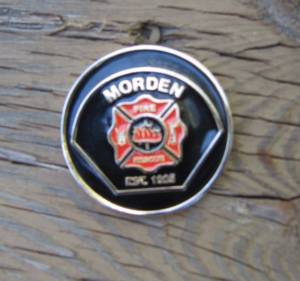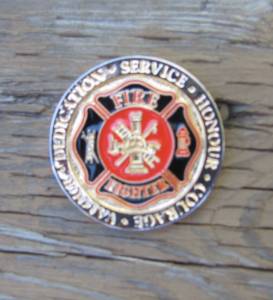
COIN HISTORY
During WWI, American volunteers from all parts of the country filled the newly formed flying squadrons. Some were wealthily scions, attending colleges such as Yale & Harvard, who quit in mid-term to join the war. In one squadron, a wealthy lieutenant ordered medallions struck in solid bronze and presented them to his unit. One young pilot placed the medallion in a small leather pouch that he wore around his neck. Shortly after acquiring the medallions, the pilots’ aircraft was severely damaged by groundfire. He was forced to land behind enemy lines and was immediately captured by a German patrol. In order to discourage his escape, the Germans took all of his personal information except for the small leather pouch around his neck. In the meantime, he was taken to a small French town near the front. Taking advantage of a bombardment that night, he escaped. However, he was without personal identification.
He succeeded in avoiding German patrols by donning civilian attire and reached the front lines. With great difficulty, he crossed no-man’s land. Eventually, he stumbled onto a French outpost. Unfortunately, saboteurs had plagued the French in the sector. They sometimes masqueraded as civilians and wore civilian clothes. Not recognizing pilot’s American accent, the French thought him to be a saboteur and made ready to execute him. He had no identification to prove his allegiance, but he did have his leather pouch containing the medallion. He showed the medallion would-be executioners and one of his French captors recognized the squadron insignia on the medallion. They delayed his execution long enough for him to confirm his identity. Instead of shooting him, they gave him a bottle of wine.
Back at his squadron, it became tradition to ensure that all members carried their medallion or coin at all times. This was accomplished through challenge in the following manner – a challenger would ask to see the medallion. If the challenged could no produce a medallion, they were required to buy a drink of choice for the member who challenged them. If the challenge member produced a medallion, then the challenging member was required to pay for the drink. This tradition continued on throughout the war and for many years after the war while surviving members of the squadron were still alive.
Today, challenge coins are carried by soldiers, sailors, airmen, and marines, as well as lawmen and firefighters. These coins identify the bearer as a member of a particular unit with a well-defined history and mission. And, wherever warriors gather, they challenge each other by “coining.” The group’s unique coin is slammed on a bar to challenge all in the group to display their own coins.

1: RULES
A: The challenge is initiated by drawing your coin, holding it in the air by whatever means possible, and state, scream, shout or otherwise verbally acknowledge that you are initiating a coin check. Another, but less vocal method is to firmly place it on the bar, table, or floor (this should produce and audible noise which can easily be heard by those being challenged, but try not to leave a permanent imprint). If you accidentally drop your coin and it makes an audible sound upon impact, then you have just “accidentally” initiated a coin check. (This is called paying the price for improper care of your coin.)
B: The response consists of all those persons being challenged drawing their coin in a like manner.
C: If you are challenged and are unable to properly respond, you must buy a round of drinks for the challenger and the group being challenged.
D: If everyone being challenged responds in the correct manner, the challenger must by a round of drinks for all those people they challenged.
E: Failure to buy a round is despicable crime and will require that you turn-in your coin to the issuing agency.
2: WHEN-WHERE
A: Coin checks are permitted, ANYTIME ANYPLACE.
3: EXCEPTIONS
A: There are no exceptions to the rules. They apply to those clothed or unclothed. At the time of the challenge you are permitted 1 step and an arms reach to locate your coin. If you still cannot reach it – SORRY ABOUT THAT!
